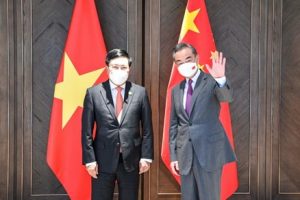
Sources: Chinese State Councilor and Foreign Minister Wang Yi (R) and Vietnamese Standing Deputy Prime Minister Pham Binh Minh meet in Nanning, Guangxi, China, July 13, 2022. /Chinese Foreign Ministry
China and Vietnam agreed to strengthen their development strategies and accelerate cooperation through the Belt and Road Initiative (BRI) and the plan of The “Two Corridors and One Economic Circle”. The agreement was reached during the 14th meeting of the China-Vietnam Steering Committee to establish Bilateral cooperation in Nanning, the capital of the Guangxi Zhuang autonomous region of South China. The meeting was co-chaired by State councillor and Chinese Foreign Minister Wang Yi and Vietnam’s Permanent Deputy Prime Minister, Pham Binh Minh.
Proposed by China in 2013, the BRI consists of the Silk Road Economic Belt and the 21st Century Maritime Silk Road. It aims to build a trade and Infrastructure Network connecting Asia with Europe and Africa along the ancient Silk Road route. The “Two Corridors and One Economic Circle” plan or initiative to enhance regional economic cooperation between China and Vietnam involving a number of regions in China and the Southwest, as well as North Vietnam. Said Wang, China and Vietnam must maintain their friendship, consolidate solidarity and mutual trust, and deepen mutually beneficial cooperation in order to serve the development of both countries and contribute to greater peace, stability and prosperity in the region.
He suggested that the two countries expand their economic and trade cooperation as well as strengthen cooperation in areas such as climate change, green development, photovoltaics, and clean energy.
The two countries, according to Minh are socialist brothers and friendly neighbours. They are also partners incomprehensive strategic cooperation, he added. Vietnam considers its relationship with China a top priority in its foreign policy. Vietnam also expressed its readiness to increase high-level exchanges between the two countries, strengthen strategic mutual trust, and as promote bilateral cooperation in a variety of fields. Wang called on both sides to commit to the path of socialism and the development of China-Vietnam friendship, safeguard the two countrie’s strategic interests , and address shared regional and global challenges.
Finally, the two countries agreed to work together on maritime issues to properly address sensitive issues at sea and achieve more tangible results. The two sides then signed an agreement on economic and technological cooperation, as well as documents on agricultural, marine and maritime cooperation.
Retreived from: https://news.cgtn.com/news/2022-07-13/China-Vietnam-agree-to-strengthen-docking-of-development-strategies-1bDAKZXXQXK/index.html